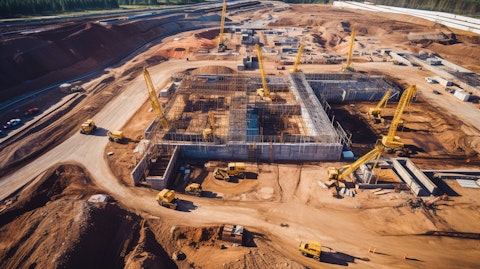Southland Holdings, Inc. (NYSE:SLND) Q3 2024 Earnings Call Transcript November 13, 2024
Operator: Good morning ladies and gentlemen and welcome to the Southland Holdings Inc. Third Quarter 2024 Conference Call. At this time, all lines are in a listen-only mode. Following the presentation, we will conduct a question-and-answer session. [Operator Instructions] This call is being recorded on Wednesday November 13, 2024. I would now like to turn the conference over to Alex Murray. Please go ahead.
Alex Murray: Good morning, everyone, and welcome to the Southland third quarter 2024 conference call. This is Alex Murray, Director of Corporate Development and Investor Relations. Joining me today are Frank Renda, President and Chief Executive Officer; and Cody Gallarda, Executive Vice President and Chief Financial Officer. Before we begin, I’d like to remind everyone that this conference call may contain forward-looking statements within the meaning of Section 27A of the Securities Act of 1933; Section 21E of the Securities Exchange Act of 1934; and the Private Securities Litigation Reform Act of 1995. Forward-looking statements are neither historical facts nor assurances of future performance. Forward-looking statements are uncertain and outside of Southland’s control.
Southland’s actual results and financial condition may differ materially from those projected forward-looking statements. Therefore, you should not rely on any of these forward-looking statements and we do not undertake any duty to update these statements. For a discussion of some of the risks that could affect results, please see the Risk Factors section of our Form 10-K for the year ended December 31st, 2023, that was filed with the SEC on March 4th, 2024, and discussion on Form 10-Q for the quarter ended September 30th, 2024, that was filed with the SEC last night. We will also refer to non-GAAP financial measures and you will find reconciliations in the press release relating to this conference call, which can be found on the Investor Relations’ page of our website.
With that, I will now turn the call over to Frank.
Frank Renda: Thank you, Alex. Good morning and thank you for joining Southland’s third quarter 2024 conference call. Third quarter revenue was $173 million with a gross loss of $51 million. It is important to bifurcate our third quarter income statement between the M&P business certain legacy projects and our new core business. Excluding unfavorable adjustments from the M&P business and certain legacy projects, our gross profit in the quarter was $20 million. The unfavorable adjustments which were largely non-cash in the quarter negatively impacted our results by $71 million. The unfavorable adjustments were driven by recent dispute resolutions, scheduled delays that increased completion costs on certain projects, and reduced expected recoveries on legacy projects.
At the end of the quarter, we had approximately $180 million of remaining M&P backlog and approximately $105 million of non-M&P legacy backlog. We expect the remaining M&P backlog to be substantially complete by the end of 2025. Despite the significant impact of non-cash charges on this quarter’s results, we are encouraged by the strong performance of our new core projects, which delivered double-digit margins. This result underscores the strength of our strategic initiatives and gives us confidence in our direction. The solid performance of our new core projects aligns well with our long-term strategy as these initiatives are not only delivering strong margins now, but also positioning us for sustained success. I’m very excited about the new core work which makes up approximately $2.5 billion of backlog.
Our new core work is the best backlog we’ve ever had. This work provides us with great visibility heading into 2025 as our new core projects continue to ramp up and our legacy projects continue to burn off. Given the strength in our new core backlog and strategic improvements to internal processes, I expect we will return to profitability in 2025. During the third quarter we also successfully executed upon several strategic initiatives to bolster our balance sheet. We closed the quarter with the strongest quarter end cash position we’ve ever had since going public. We closed the $42.5 million real estate transaction in July. We also closed $160 million senior secured term loan facility with Callodine Commercial Finance in the quarter. The initial term loan consisted of $140 million initial draw term loan and a committed $20 million delayed draw term loan.
This refinance extended the maturity of a large portion of our debt to 2028. The real estate transaction and the new facility significantly strengthened balance sheet. This strengthened balance sheet gives us additional flexibility, enabling us to capitalize on new opportunities, confidently execute on our backlog and respond swiftly to market changes. With our enhanced cash position, we are better positioned to drive higher profitability and pursue attractive opportunities in our markets. We ended the quarter with $2.74 billion of backlog, essentially flat from last quarter and up from $2.54 billion at the end of the third quarter last year. We booked approximately $140 million of new awards during the quarter. This included $132 million water treatment plant for the Bureau of Reclamation.
We also have several projects, which we are the apparent low bidder on and expect to convert into backlog after finalizing contract negotiations. We are thrilled with the momentum of our new core backlog, but the pipeline we are tracking is truly exceptional, the most robust and promising we’ve ever seen. We believe we are well positioned to capitalize on this significant opportunity. We are experiencing sustained demand across our core markets as demand for infrastructure construction services continues to outpace the supply of qualified contractors. This imbalance has created a unique opportunity for us to bid on projects with limited competition. Moving forward, we will remain selective, focusing on projects that align well with our strengths and objectives.
A key component of our strategic plan is to focus on securing smaller dollar, shorter duration projects that yield quick cash flow. We’re pursuing numerous shorter duration projects in the $30 million to $150 million range that expect to bid over the next six months. Our Civil segment market continues to be very attractive and is a key area of focus for us to pick up shorter duration projects. We’re also tracking some larger projects in our Civil segment, including the $600 million I-35 CapEx drainage release tunnel in Austin, Texas; the $350 million Hydro One tunnel in Toronto, Canada, $120 million civil and utility package for Dallas-Fort Worth Airports Terminal F $500 million Hudson River Gateway Tunnel in between New York and New Jersey.

In our Transportation segment, upcoming opportunities include the $300 million I-195 Washington Bridge replacement in Rhode Island and the $1 billion Garden City Parkway Sky Bridge in Ontario, Canada. We’re also actively engaging with state and local officials in the Southeast to explore ways we can support and contribute to rebuilding the region’s infrastructure following the recent natural disasters. Additionally, we expect to have the opportunity to bid on smaller packages from large programs we are tracking over the coming quarters. This includes the $1 billion Red River Valley Water Supply program in North Dakota. We are currently working on an initial phase of this program. We’re also tracking various packages from the approximately $7 billion GBRA Water Secure program, a $2 billion program for the Northern Colorado Water District and a $440 million water program for the City of Thornton, Colorado.
We’re tracking over $20 billion of transportation projects in the Northeast. We’re also following projects in some of our key transportation markets, including Texas and Florida, which are planning to spend tens of billions of dollars in the coming years. This robust pipeline gives us clear visibility into long-term growth opportunities that will drive our business for years to come. With unmatched resources and expertise, we are uniquely positioned to fully capitalize on this unprecedented potential. To recap, we faced several non-cash losses this quarter, largely due to the impacts of the M&P business and certain legacy projects. We are excited about how our new core work is performing and the visibility our new core backlog provides us as we head into 2025.
We have also made significant strides to improve our balance sheet and ended the quarter with the highest quarter end cash balance we have had since becoming a public company. The improvement in our balance sheet positions us well to perform on our great backlog and capitalize on the best pipeline of opportunities we have ever seen. Before closing, I’d like to highlight some recent achievements by our teams. Thanks to the hard work and dedication of our people, we have recently achieved several operational milestones including opening the East and Westbound lanes of paving project in Arkansas and completing the final concrete deck placement on a challenging bridge project in the Midwest. Additionally our Mill Creek tunnel project team achieved an impressive safety milestone, surpassing 1.5 million work hours without a single lost time incident.
Thank you to each of our team members for your unwavering commitment to safety and quality, which sets us up for a strong 2025 and beyond. With that, I’ll now turn the call over to Cody for a financial update.
Cody Gallarda: Thank you, Frank and good morning, everyone. I’ll provide an overview of our financial performance during the third quarter of 2024. You can find additional details and information in the financial statements, footnotes and management’s discussion and analysis that were filed on Form 10-Q last night. Revenue for the quarter was $173 million, down from $312 million in the same period in 2023. Legacy headwinds and impacts from hurricanes negatively impacted production during the quarter. Additionally, the timing of project closeouts and new project starts also contributed to the decrease in revenue year-over-year. We substantially completed a large marine project in the Bahamas during the second quarter of this year.
This project contributed $54 million more to revenue in the third quarter last year, compared to this year and delayed starts resulted in us not replacing as much revenue as anticipated in the quarter. Gross loss for the third quarter was $51 million, compared to a gross profit of $30 million from the same period in 2023. Gross profit margin in the quarter was negative 30%, compared to 10% in the same period of the prior year. Unfavorable charges of $72 million from legacy projects impacted results. This was the result of certain dispute resolutions schedule delays that increased completion costs on certain projects and reduced expected recoveries on legacy projects. These charges had significant non-cash impacts in the quarter. Selling, general and administrative costs in the third quarter were $17.5 million, an increase of $2.2 million compared to the same period in 2023.
Interest expense for the quarter was $7.5 million, an increase of $1.3 million, compared to the same period in 2023. The difference was attributable to increased borrowing costs and higher debt balances. We expect interest expense to be approximately $9.5 million per quarter on a go-forward basis. Income tax benefit was $17 million for the quarter compared to tax expense of $5 million for the same period last year. On a go forward basis, we expect our effective tax rate to be in the 20% to 24% range, depending on certain tax credits, nondeductible items and certain state and local taxes. We reported a net loss of $55 million or negative $1.14 per share in the quarter compared to net income of $4 million or $0.08 per share in the same period last year.
In the third quarter, we produced EBITDA or earnings before interest taxes depreciation and amortization of negative $59 million compared to EBITDA of positive $22 million for the same period in 2023. Now to touch on segment performance for the quarter. Our Civil segment had revenues of $56 million, a decrease of $35 million from the same period in 2023. Our Civil segment gross loss was $18 million, compared to a gross profit of $12 million in the same period in the prior year. As a percentage of revenue for the quarter, our Civil segment had gross profit margin of negative 33% compared to 14% in the same period in 2023. Unfavorable charges of $27 million from legacy civil projects impacted results in the quarter. For the quarter, our Transportation segment had revenues of $117 million, a decrease of $104 million from the same period in 2023.
As previously discussed, we substantially completed a large marine project in the Bahamas during the second quarter of this year. This project contributed $54 million more to revenue in the Transportation segment in the third quarter last year compared to this year. Our Transportation segment gross loss was $33 million. This compares to a gross profit of $17 million in the same period in the prior year. As a percentage of revenue for the quarter our Transportation segment had a gross profit margin of negative 28% compared to positive 8% for the same period in 2023. Unfavorable charges of $44 million from materials and paving and legacy projects significantly impacted this segment’s results. This segment was impacted by $18 million of charges in the Materials & Paving business, and a $17 million charge on a bridge project in the Midwest, which was largely due to a dispute resolution.
These charges were significantly non-cash in the quarter. Turning to the balance sheet. As of September 30, 2024, we had net debt of $212 million inclusive of cash and restricted cash of $107 million. As previously announced, we closed a $160 million senior secured term loan facility with Callodine Commercial Finance in the quarter. The initial term loan consisted of a $140 million initial draw term loan, and a committed $20 million delayed draw term loan. This facility provided us with additional liquidity and extended our debt maturities significantly to 2028. As we move forward, we’re encouraged by the potential for substantial future cash inflows from the resolution of disputes and change orders related to our legacy projects, along with the strong performance we’re seeing in our new core projects.
Thank you for your time and interest in Southland. I’ll now pass the call back to the operator for your questions.
Q&A Session
Follow Southland Holdings Inc. (AMEX:SLND)
Follow Southland Holdings Inc. (AMEX:SLND)
Receive real-time insider trading and news alerts
Operator: Thank you. And ladies and gentlemen, we will now begin the question-and-answer session. [Operator Instructions] And your first question comes from the line of Adam Thalhimer with Thompson Davis. Please go ahead.
Adam Thalhimer: Hey, good morning, guys. Tough quarter.
Frank Renda: Hey, good morning, Adam.
Adam Thalhimer: The $105 million of non-M&P legacy backlog what’s the time frame on that burning off?
Cody Gallarda: So that we expect to be substantially complete by the end of 2025, with one project that will have a tail into 2026, but we believe it will be immaterial at that point.
Adam Thalhimer: Okay. What was the revenue impact from the unfavorable — from the non-cash unfavorable adjustments in the quarter?
Cody Gallarda: So when you look at what we’ve disclosed there’s approximately $71 million that were a decrease in recognized revenue based on the cumulative catch-up impacts of percentage completion accounting that contributed to the lower top line volume. The remaining contribution to the top line decrease and forgive the backward speak there but had to do with projects being pushed out to the right on the time line. The work hasn’t gone away. We still have the $2.5 billion of great new core backlog, we’re excited about. But that was the contribution — that was the decrease in contribution that led to the volume dip in Q3 in addition to — that included the project in the Bahamas we specified in our opening remarks.
Adam Thalhimer: Okay. And Frank, what how do you think about — you talked about focusing on smaller quick turn work $30 million to $150 million, but then you also gave a list of mega projects that you’re going. How do you think about how you’re going to allocate resources going forward between those two buckets?
Frank Renda: Yeah. So it’s a balance, Adam, and we want to make sure that, we have the staple project in areas and then also can maximize our resources by taking some of those $30 million to $140 million projects. And so when I talk about balance you want to balance the cash coming in kind of maximizing resources right now to put ourselves in the best position to make sure we get the highest returns possible. And the reason I talk about all the projects is because every program right now really is hot, whether it’s transportation, whether it’s water, wastewater, disappointing tough quarter but the pipeline is incredible out there and you kind of hit on it. The key to maximizing that return is to maximize what you can get from your resources. And that’s why we’re looking at a mix of projects right now.
Adam Thalhimer: Got it. Last one for me. What do you guys think the timing of additional claims settlements will be?
Cody Gallarda: So we’re at the table on a number of them. We’ve disclosed in the past that we’ve got half of our contract assets balance here are in claims on fully completed projects. We expect significant cash flows coming off from those settlements as owners are running out of abilities to delay, owing us money and we believe we’re due and think that will be a large part of our 2025 story and cash generation.
Adam Thalhimer: Thanks. Thanks guys.
Cody Gallarda: Thanks, Adam.
Operator: And your next question comes from the line of Brent Thielman with D.A. Davidson. Please go ahead.
Brent Thielman: Thanks. Good morning, guys. I just had a question on the non-M&P legacy business. Maybe you could talk through when those projects were picked up, or is this new to the business something you came across? Just a little more history around that piece of the portfolio would be helpful.
Frank Renda: Yeah. Thanks, Brent. Touching on those non-M&P projects that I think you’re referring to. We remain really confident in the Civil segment. The majority of the work performed really well this quarter in Civil. It was overshadowed by those couple of legacy projects that you touched on. We had charges that had cumulative catch-up effect, which drove the current period profit margin negative. Our legacy backlog is down to $105 million and is expected to be substantially complete over the next few quarters. Absent the legacy impacts, our Civil produced mid-teen margins. And as far as when those projects were picked up Brent they were picked up in that 2018-2019 time frame and we expect those to be wrapping up in 2025.
Brent Thielman: Okay. Excellent. And then, I guess, look the bidding climate is very healthy. With the changes you’ve made to the capital structure and I guess as you look at your bonding capacity available today, Frank, I mean you did talk around some other project pursuits that are out there. But I’m trying to understand your capacity to add more business at this stage to what you already have. I guess what’s the threshold backlog can go to relative to what you’re able to do right now?
Frank Renda: Yeah. So we’re sitting with a near backlog of $2.5 billion in our new core backlog. That’s the best in our company’s history. Our surety partners are an integral part to our long-term success and we meet with them regularly to talk about all the opportunities that we are tracking. We look at our resources in regards to equipment personnel where we’re at in different locations having that $2.5 billion in core backlog, total $2.754 billion in total backlog. That $2.5 billion gives us visibility into exactly what we can do over the next few years. And as far as what we can add, Brent, we’re just going to be extremely selective. The jobs that we’re targeting have to be absolutely perfect to maximize the return that we’re going to get on our resources.
We think we have the best backlog, $2.5 billion in our core market, but we see the pipeline as even a greater opportunity than we have right now. So extremely tough quarter, but we have completely reset. We’re laser focused on our core market and exactly what we do and we expect to return to profitability quickly in 2025.
Cody Gallarda: Yes. I think Brent maybe just to add a little color from the balance sheet side, we’re sitting with the strongest cash position that we’ve had since going public, which is a big part of kind of where we are in this turnaround section for Southland. Not optimal, as Frank mentioned before, we echo very disappointed in the quarter, but I can’t be more optimistic about where we’re going.
Brent Thielman: Yes. Maybe just a follow-up to that. I mean it sounds like maybe the timing of ramping up on some of this work pushed to the right a little bit. Obviously, there’s a lot of activity in Southeast here recently maybe that had some influence. But as you ramp up on these projects and setting anything else aside with the legacy sort of backlog or collections efforts, I mean should you expect to see an acceleration in cash flow with that, Cody, I’m just trying to get a sense of how we can think about cash flow ex, some of the here are in the business right now?
Cody Gallarda: Yes. Great question. We think there’s a high probability and opportunity for that, particularly as you look at kind of the leading indicators on cash flow with the increase in VIE that we’ve had as well as some of the decreases in CIEs we’ve had some settlements and work complete with the legacy portfolio. So I think when you look at the cadence of what we’ve announced over the last, I’d say, 24-month horizon on projects earlier on in that time period we had some significant larger projects that are starting off slower than we had initially hoped for. They did provide great mode payments, which contributed to that increase in VIE and the health of our cash position. But it’s also why you’ve seen the more recent announcements focused on that smaller side and getting, as Frank mentioned, some of that quicker turn work to focus on cash generation to help us bridge the gap to these larger projects really kicking off and making a meaningful impact.
Brent Thielman: Got it. Okay. Thanks guys. I’ll pass it on.
Cody Gallarda: Thanks, Brent.
Frank Renda: Thanks, Brent.
Operator: And your next question comes from the line of Christian Schwab with Craig-Hallum. Please go ahead.
Unidentified Analyst: Hey, guys. This is Tyler on behalf of Christian. Thanks [indiscernible]. A few questions here. Maybe first could you quantify what the revenue impact was from the push on the quarter due to hurricanes and other project start times?
Frank Renda: Yes. I think Tyler good to hear from you. Thanks for joining. When you look at the overall volume decrease in cost of goods and we’re at that call it, $60 million mark, which makes up about half of kind of the overall shortfall, that’s going to be representative of that time line shift that we talked about where the work is still coming and just moved to the right on the time spectrum. The rest of it being some of the projects we mentioned earlier that contributed to the decrease in revenue. So it’s still coming. The third quarter dip is an anomaly from our perspective and what we expect going forward and think we’ll have a good recovery volume-wise in Q4 and that will extend on into 2025 as that large great backlog for us makes more of a contribution.
Unidentified Analyst: All right. That’s great. And then, of the $180 million left in the M&P work and then I think it was $105 million of other kind of bucketed legacy work. Is there a way to think about what those gross profit impacts of the rest of that business might look like over the next several quarters or through next year? Or is it really kind of hard to tell just based on individual projects and resolutions?
Frank Renda: Yes, I appreciate you giving me the easy out there. I’ll try and go a little bit beyond that. We book projects as we do every quarter. That number continuing to dwindle. We feel very good about the new work making enough of a larger contribution to overshadow what’s left of that zero margin and lower margin work in the $180 million. So, hope to see that make less of an impact moving forward and really speak to the health that we see in the business mid and long-term.
Unidentified Analyst: Okay. And then last one here I think. The Civil and Transport both segments down sequentially kind of similar percentages in the quarter. You guys sound excited about some opportunities you have on the Civil side. Just as we see a recovery in growth next year any way to bracket how we think about those two segments comparatively? Would you expect Civil to grow faster from these levels next year transport to recover? Any view on those two comparatively? Thanks.
Frank Renda: Yes. We’re excited about both markets. Civil are typically quicker burn projects. So, if we pick up five or six civil jobs, we would expect those to burn a little bit quicker. As far as transportation, there’s just so many opportunities out there. But specifically to next year those might be a little bit longer burn. But the $2.5 billion of backlog that we already have in Transportation and Civil, I think we’ll start to see those really show themselves in the first quarter of next year and running off in the next couple of years. So, excited about both and expect to return to profitability in 2025.
Unidentified Analyst: Got it. That sounds great. That’s all for us. Thanks guys.
Frank Renda: Thanks Tyler. Appreciate it.
Operator: [Operator Instructions] And your next question comes from the line of Julio Romero with Sidoti & Company. Please go ahead.
Julio Romero: Thanks. Hey good morning Frank, Cody, Alex.
Frank Renda: Good morning Julio.
Julio Romero: Maybe — hey, could we — how should we be thinking about backlog conversion in the fourth quarter? Maybe to start there.
Cody Gallarda: Yes. So, we think backlog conversion in the fourth quarter, we expect to see some of that the time line shift that I referred earlier coming to fruition in Q4. There still are uncertainties around project starts as we’ve always discussed. So, we do see a recovery volume-wise from the dip that we had in Q3, but we expect to fight through that and then getting into 2025 to echo Frank’s opening remarks is where we really see that return to profitability for both of our segments.
Julio Romero: Got you. I guess another way of asking is just do you think volume rebound sequentially in fourth quarter relative to the third quarter?
Cody Gallarda: Yes, we do see volume rebounding just given the level of charges and also their impact on derecognition of revenue from prior periods kind of being that non-cash element we discussed. So, yes, we do expect a sequential recovery in top line numbers.
Julio Romero: Got it. No, that’s very helpful, Cody. Thank you. And on M&P how should we kind of think about the cadence of this $180 million or so of M&P revenue to burn off in the next five quarters? Should we kind of just model like a straight line $35 million or do you expect some lumpiness earlier in that timeline or later? Any help there.
Cody Gallarda: Yeah. No. Its great question, Julio, I would not recommend a straight line. There is going to be kind of work that finishes off earlier and then tapers down. There is a decent chunk of work out there that we’re negotiating with the owner on what finishing that remaining backlog looks like And we’ll have more information on that when appropriate. But we still fully expect to be substantially complete over the next few quarters. And then, hopefully plan on M&P being down to an immaterial point where we won’t be discussing it after 2025.
Julio Romero: Okay. That’s helpful. I think last quarter when you guys spoke about dispute settlements you gave us a cash inflow number that was expected for the third quarter. Just wondering if you could give us the same kind of cash flow expectation from dispute settlements for the fourth quarter?
Cody Gallarda: Yeah. No, that was specific to the events that happened on the Arkansas, Paving Job which we had announced. So no, announcements or expectations on cash conversion from claims in the M&P segment or otherwise in Q4 and beyond. Suffice it to say though, as mentioned earlier we expect significant cash inflows from claim settlements as we’re near the finish line on several large claims throughout 2025 depending how those negotiations finalize out.
Julio Romero: Got it. Very helpful there, maybe last one for me would just be talking a little bit more about the shift to some of these shorter duration projects. Can you maybe speak to some of the processes you’re taking on the risk mitigation front that might be different and help stem some of the issues you’ve seen on some longer duration work? I think Frank, you mentioned being extremely selective with projects. Just any other detail you could provide in terms of kind of what you’re doing differently that can kind of help minimize the risk of losses.
Frank Renda: Yeah. Sure. So I think the shift started a couple of years back. It just takes a while on some of these projects to get started and to kind of start paying off. But we are targeting projects in our core market. And of the $2.7 billion that we talked about $2.5 billion are in the core markets. Of that, we’re looking at more-and-more short-term quick hitting projects, because we have a lot of the staple projects that we need in areas. So you’re looking for bolt-ons with higher margins. And I guess the shift that I would say was getting out of the M&P business was the main decision that we made. And so you’re going to naturally have more quick hitting Civil projects. But we are focused on picking up the right projects and there’s hundreds to choose from in that $30 million to $150 million range in the Civil segment, so really excited about that market.
Cody Gallarda: Yeah. I think also I might just add on just some details behind Frank’s emphasis on changes we made several years ago. I really want to commend our entire procurement team starting with Jon Dorma and Ken Chaffin and the rest of their staff on really overhauling our entire procurement process and focusing on a qualitative and quantitative assessment process to make sure that we’re covering all of our risk points to the best that we can. So we’re set up for that long-term risk mitigation. So as Frank mentioned it takes a while for that to flow through and demonstrate it in our financial results but we’re confident that we’ll be able to discuss that in upcoming calls.
Julio Romero: Great. I appreciate the color. Thanks very much.
Cody Gallarda: Thank you.
Operator: And I’m showing no further questions at this time. I would like to turn it back to Frank Renda, for closing remarks.
Frank Renda: Thank you all for your interest in Southland. And look forward to speaking next quarter.
Operator: Thank you, presenters. And ladies and gentlemen, this concludes today’s conference call. Thank you all for participating. You may now disconnect.
Follow Southland Holdings Inc. (AMEX:SLND)
Follow Southland Holdings Inc. (AMEX:SLND)
Receive real-time insider trading and news alerts




